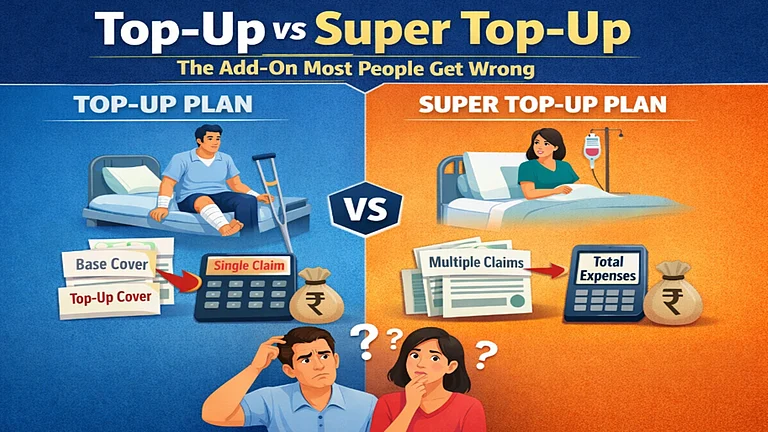
Summary of this article
Medical inflation has made people anxious about adequate health insurance coverage. In response, insurers are offering "unlimited" plans, playing on the psychological fear of medical bills exceeding coverage limits.
However, policy buyers should carefully examine the policies and look for hidden co-payments, sub-limits, or other restrictions that limit payouts, and may not be sustainable in the long-term.
By Chakravarthy V.
One financial fact that has become impossible to ignore in the last ten years is that healthcare prices in India are increasing faster than any other household expense. Medical inflation is thought to be 14 - 15 per cent each year. This means that therapy that costs Rs 10 lakh today might cost more than Rs 40 lakh in ten years. Because of this compounding effect, families have had to reconsider what "adequate" health insurance truly means.
For a long time, the standard was low - Rs 3 - 5 lakh looked like adequate. Then, as prices went up and complicated processes became more prevalent, Rs 10–20 lakh became the new normal. Soon after, people started talking more about covers for Rs 50 lakh and Rs 1 crore. The business is now trying out a new idea in response to rising anxiety: limitless health insurance coverage.
The question is whether limitless coverage solves the problem or just complicates things.
Why has the word "unlimited" come up?
It's simple to see why the appeal is there. Policyholders' biggest fear isn't whether they will become sick; it's whether their insurance will cover them when they do. Finding out that a cap has been broken and you have to pay for treatment out of your own cash is one of the most upsetting things that can happen.
Unlimited coverage is sold as the solution to this worry. The idea is simple: there is no limit to how much therapy may cost. The psychological aspect is strong. In a world where healthcare expenses might seem random, the promise of "no limits" gives people a sense of control.
The way hospital costs are set up is another reason. Room rent frequently includes costs like doctor's fees, ICU charges, and operating room costs. The total fee goes up a lot as more Indians choose private or single rooms instead of communal wards.
The economics of rising health costs
To understand why limitless policies are becoming more common, it helps to look at what causes medical costs to go up. Several things are going on:
Adopting new technologies: New therapies and better equipment lead to better results, but they also cost more.
Lifestyle diseases: More people are getting diabetes, heart disease, and cancer, which means treatments will take longer and cost more.
Healthcare infrastructure: Private hospitals are the most common kind in metropolitan India, and their prices are based on demand and greater service expectations.
Older people: As life expectancy goes up, the chances of going to the hospital more than once in a lifetime go up.
Even a crore-rupee policy would not seem like enough ten years from now. In principle, unlimited coverage means you don't have to keep "upgrading" as inflation chips away at your buying power.
The hidden difficulties
But the truth is more complicated than the promise sounds. Insurance is not a way to help people; it is a way to share risk. To make limitless coverage work, insurance companies have to either charge very expensive premiums or set up rules that limit payouts in other ways.
Some of these conditions might be:
Co-payments are when the insured pays part of the charge.
Sub-limits that depend on the kind of operation or room rent.
Riders that only let you have "infinite" coverage in certain situations.
This means that "unlimited" typically has limits that aren't clear at first.
Sustainability is another worry. In India, you may get health insurance for a year and then renew it. Even if a program appears good today, insurance companies can adjust the prices, features, or even cancel the plan if it starts to lose money. This is still a big risk for policyholders who want to be sure for life.
Do we truly need "infinite" coverage?
From an actuarial point of view, claims with very large values are unusual. Most hospitalisations are covered by high-value insurance plans that are currently available. So, the increase in limitless plans is more of a psychological demand than a statistical one. People are afraid of being the one who stands out, the one who goes over the limit. By selling limitless plans, insurers are making money off of that anxiety.
This doesn't mean they're wicked by nature. These kinds of items are actually an attempt to come up with new ideas in response to real worries that people have. But it does make you wonder if we are fixing the correct problem. Is the problem really that there isn't infinite coverage, or is it that healthcare prices aren't clear and stable over time?
Final Thought!
Unlimited health insurance isn't really about infinity; it's more about how people think. It tries to put a price on peace of mind in a world that is not always clear. Whether this is a long-term answer or just a short-term marketing experiment will rely on a lot of things that have nothing to do with policy design, such as how hospitals bill, how insurance pays claims, and how regulators keep things stable.
(The author is Cofounder & Executive Director, Prime Wealth Finserv Pvt. Ltd.)
(Disclaimer: Views expressed are the author's own, and Outlook Money does not necessarily subscribe to them. Outlook Money shall not be responsible for any damage caused to any person/organisation directly or indirectly.)
















